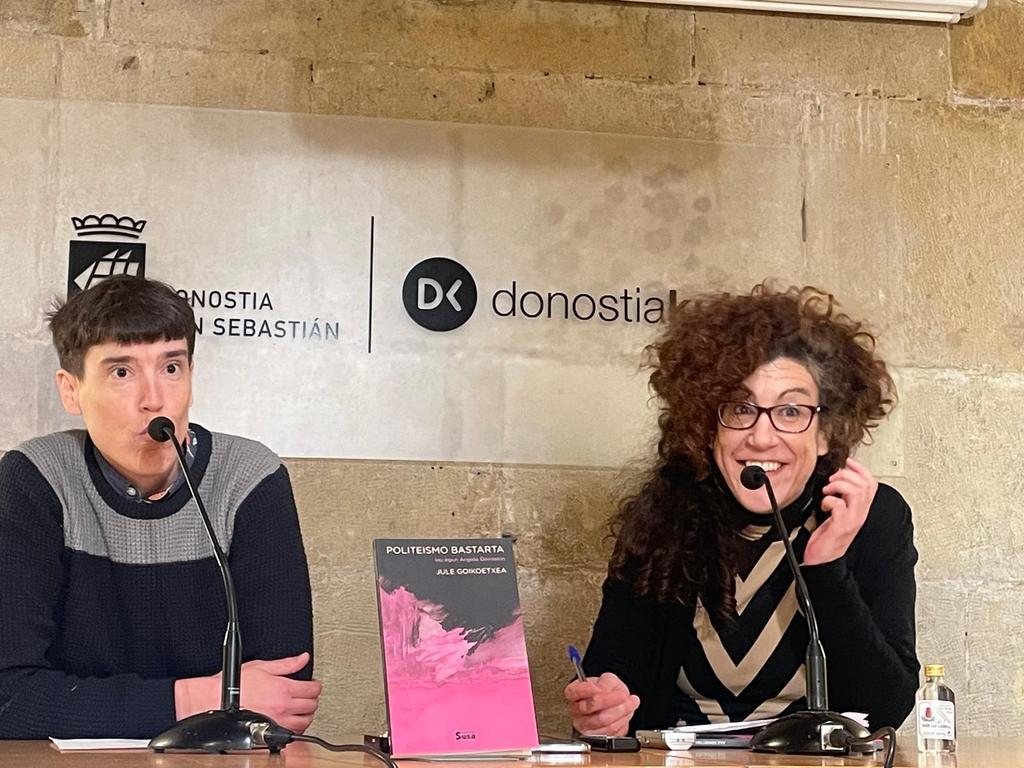Bleeds the literature
- How is menstruation represented in the Basque literature? Ainhoa Aldazabal Gallastegi has found in the books in which he has worked both silence, taboo and pain regarding menstruation, as well as narrations that reveal a new menstrual perspective. This article, based on Basque narrative and poetry, is the first part of a two-piece work; the second part that will be published later will address the monthly representation in comics and hybrid books.

Silence. Invisibility. Taboo. These are the words around the month. Some of you will tell me that nothing else is being talked about now, that it is fashionable and that the women of our generation have been lucky. But when I ask for the first month, the words that continue to come out are shame, fear, insecurity, surprise, and mechanistic.
The phenomenon in which we live in half of society often has a difficult path between mothers and daughters. Comments such as “Ai, maittia, emakume egin zara”, with the weight and burden that women can have in this society, usually coincide with the first month. We are not told much more.
The school textbooks also give a systematic and aseptic explanation in general. It is a blood effusion that occurs every 28 days. The dead baby we throw after ovulation because we haven't become pregnant is shaped like blood. And some hormones dance aurresku with unbearable txistu music. You know, we're just hysterical.
We started almost from scratch to meet a red traveler who will help us for many years. And living each other differently would not be a catastrophe if the rule were not political. It is so political that a controversy of the past few months has to do with the massacre that generated the bill to request the leave for the painful of the month (that we would invent the pain, that would give us lower, that the pain is very subjective, that the woman will stigmatize us…). However, there are reports that have not generated enough controversy. In this same weekly I read that the applications we use for menstruation control tend to target aborted women. In case of doubt, the heteropatriarchal system strictly controls our blood to infringe and assimilate reproduction. This is explained by Caliban and the witch of Federici (Elkar, 2014).
I'd rather talk about menstruations than menstruation. All experiences, voices and narratives are still necessary. Given the breadth of our literature, I wanted to find the word menstruation, but I found words like silence, invisibility and taboo. With this starting point, I would like to talk here about books that at some point, phrase or pass the word menstruation. And see the imagination of the rule. Forgive if I've had a book. It could be a good sign if there were something more than those mentioned.
On this occasion we will focus on narrative and poetry, leaving for the next analysis of comics and hybrid books. In the classical novel Zergatik panpox (Erein, 1997) by Arantxa Urretabizkaia we will read the voice of the protagonist. This inner monologue brings us the voice of tradition and the imaginary of the rule appears mixed with other themes: If my mother had cleaned her head with a head nut / My father and brother should not see any trace of blood / Blood yes, with shame and in secret. The protagonist also reflects on its relationship with the rule: There is nothing more hateful in the world than a Sunday that touches the beginning of menstruation, a Sunday without Txema, besides, I did not accept menstruation / Txema, although I will never recognize it, the days when I had menstruation my body was retracted, as I am also retracted. It detects popular beliefs about the rule, representing the rule as something obscene, dirty and almost diabolical. Txema's disgust also appears, a man who conditions sexual intercourse.
The words of Laura Mintegi, Nerea and I (Txalaparta, 1994), related to the rule are: disease, melancholy, punishment, imposition, life imprisonment, death, injustice... in the text we can touch the anger produced by almost the menstruante.
See Agur Meabe devotes an entire chapter to menopause in his book A Crystal Eye (Susa, 2013), entitled A Dangerous Age. Insert a more clinical expression with the first person, producing a special effect: I've been using mineral pills for a long time, one in the morning. Yes, I have kept it. From tomorrow I will try to have breakfast with desire and do some sport (...) I have stretch marks in my stomach (...) Since spring I have come a menstruation, a couple of long marks, in May, a desire and an unbeatable dark fluid, not very recent jets. I already have the fifth cut, which may be the last. However, menopause is not limited to menses. It is interesting to note this vital stage. Because mortal women are prolific as they bleed, potential mothers. And, therefore, we could say that it is a positivized stage (in patriarchal terms, of course). But this Meabe section brings us tobacco. Because it talks about an even more invisible stage.
In Sano Radical (Alberdania, 2020) by Isabel Díaz we have a poem that talks about menopause: Pause, menstrual loss. He calls it Climaterio and offers us a new vision of the subject. It talks about slowing down, slowing down. And despite being a loss, it poses it as a possibility of binary changes.
In the book of poems Ezkatak (Susa, 2006) by Leire Bilbao we find three poems on the subject. In blood poem 1 proclaims the mortuary subject, and in addition to using the word menstruation five times to show blood, draw in the mirror with blood. Compared to the previous texts, the poet uses a more sociable tone to menstrual.En blood, the writer uses a sensual tone in 2 poems, but also provocative. The poem starts with this powerful image: I have spotted blood the tips of the fingers // and bring it to the mouth with doubts // This blood that my body does not want // has no bitter taste. It's very visual, and it shows an attitude that can be shocking. Emasabela speaks in the poem of the force that creates menstruation, yes of the ability to be a mother, but also to create (re)projects, thus questioning the hegemonic discourse.
Ione Gorostarzu makes an interesting approach in his book of poems Des egiten (Elkar, 2012). Because blood is a reminder of the possibility of being a mother and she poses it as a conscious option: I can create - and die - always - someone.
Although silence on the subject predominates in the Basque literature, each book brings different voices and experiences. In this society there are pain, insecurity and fears generated by menstruation, such as those brought to the right. We have also read the special and concrete state of menopause. And they also talk about empowerment and the possibility of knowing and reproducing us. There is something. And yet it is insufficient. After a few blood cycles we will bring more books written from the viscera, in order to address the issue from other places. We need more blood-filled books to be able to gather the variety of the experience. We live through blood. We are blood.
Joan Tartas (Sohüta, 1610 - date of unknown death) is not one of the most famous writers in the history of our letters and yet we discover good things in this “mendre piece” whose title, let us admit it from the beginning, is probably not the most commercial of the titles... [+]














ilbeltza-(1).jpg)









.jpeg)
